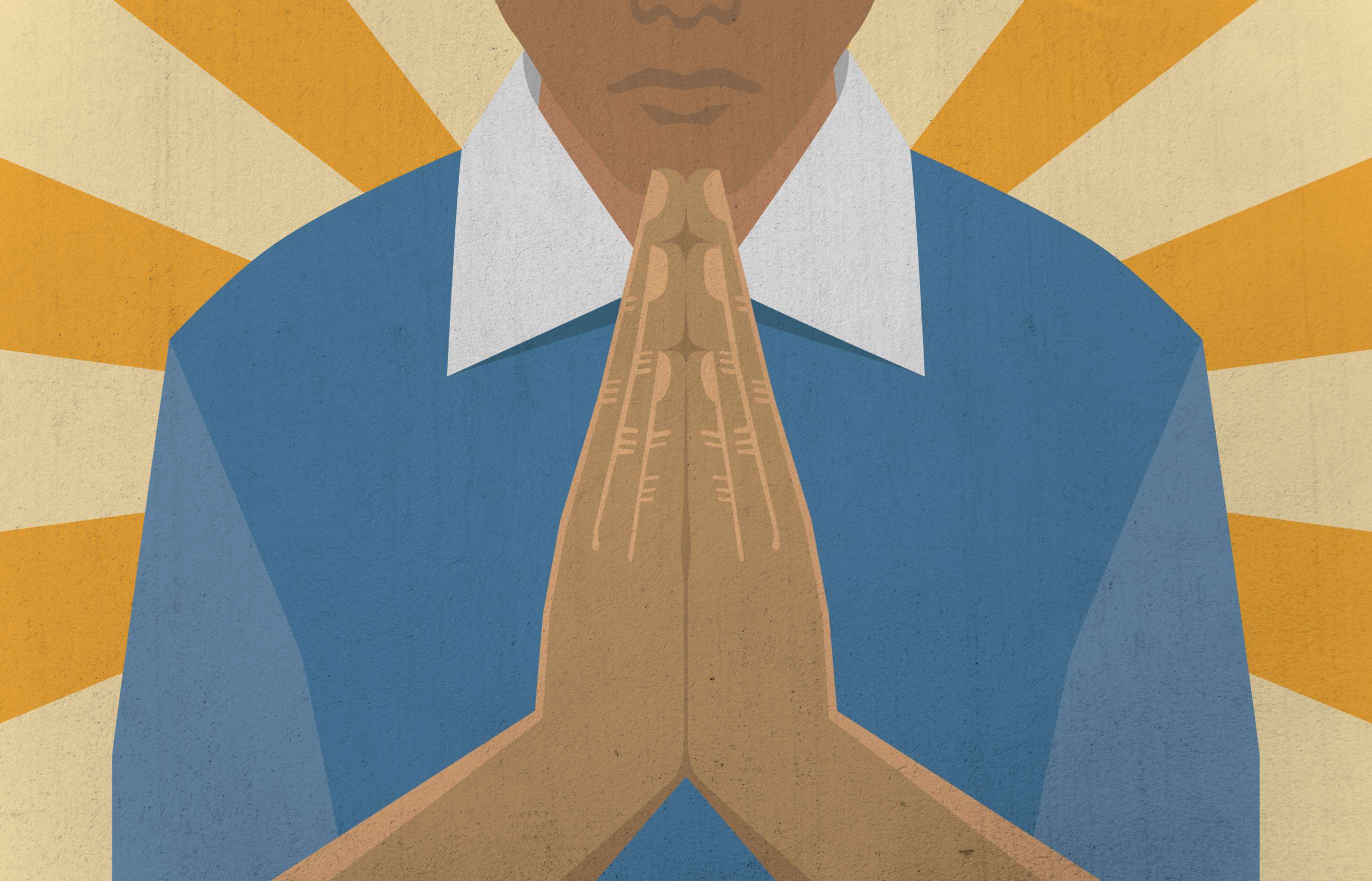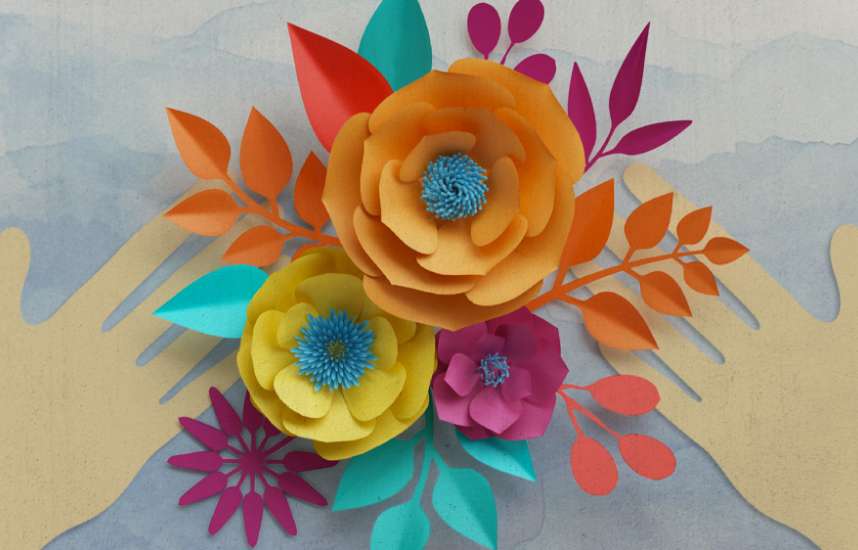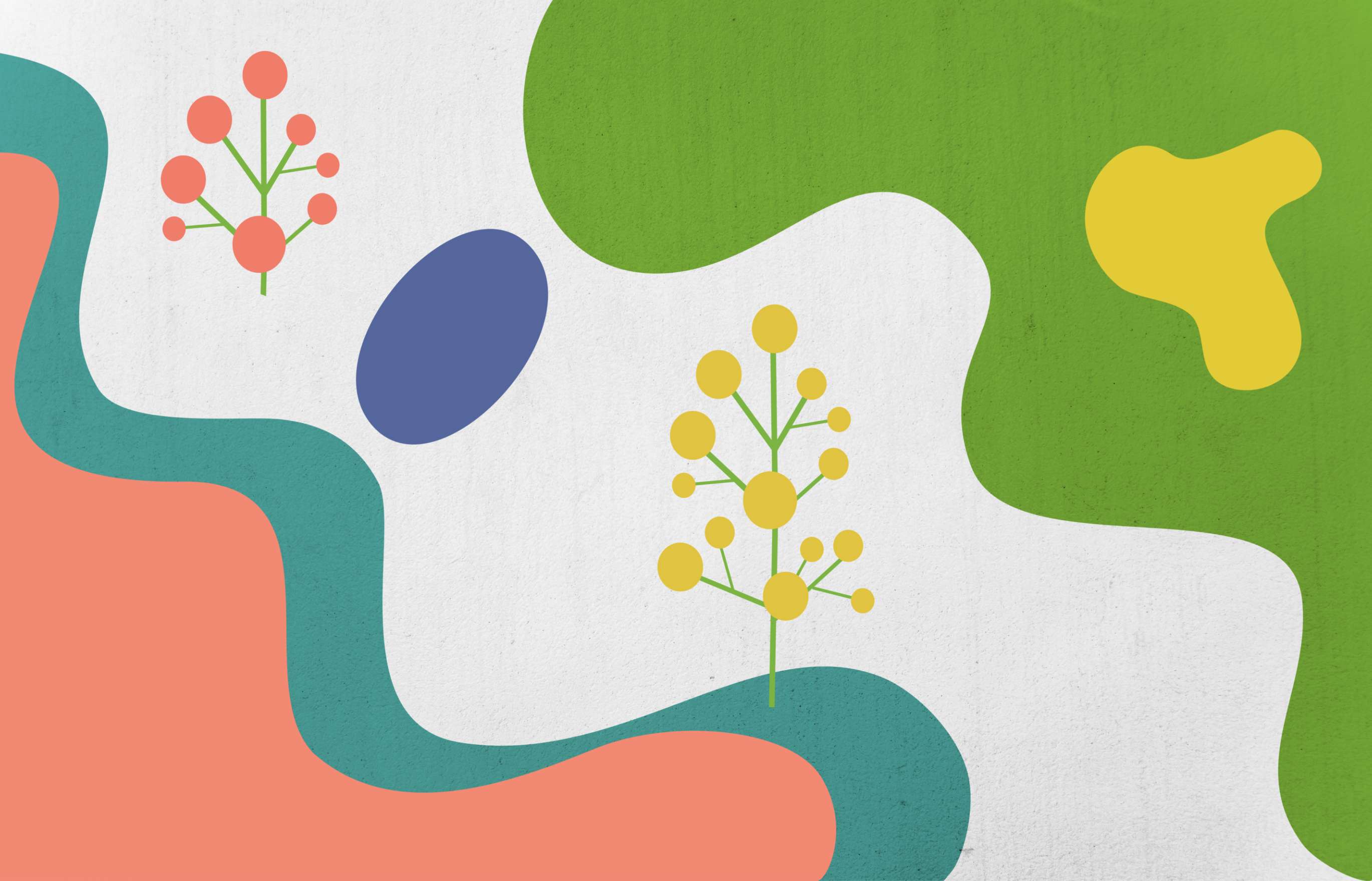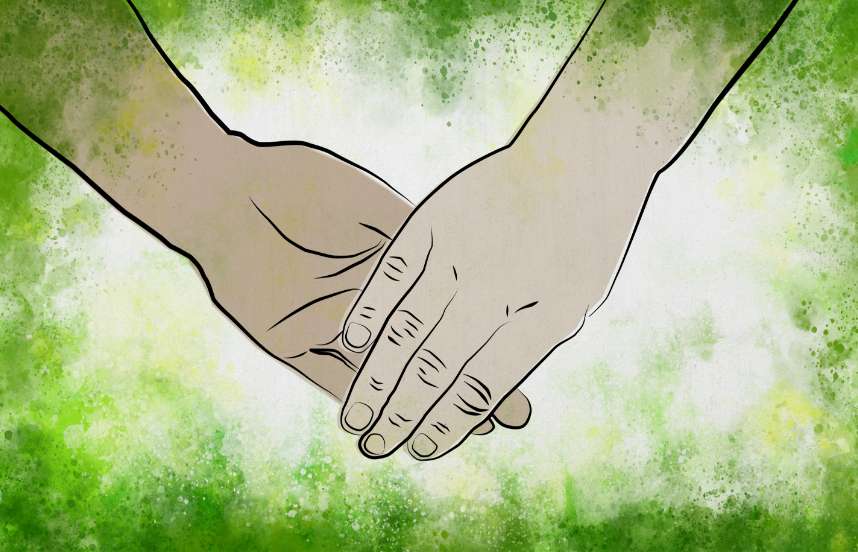The spirit of gassho: cultivating gratitude as a spiritual practice
Her Holiness Shinso Ito
December 11, 2023

To be a practitioner of Shinnyo Buddhism means interacting with each other in the spirit of gassho, or reverence and gratitude. It is the same feeling we have toward the Buddha and the Dharma. Having this kind of reverence and gratitude toward everyone—at home and in society in general—is what it means to live a spiritual life. That’s the path of the Great Vehicle. Exchanging a warm greeting, expressing appreciation, or humbly making an apology are first steps towards attaining a larger inner capacity with which one can place oneself in the position of others and extend a sincere and true heart to them.
Just as you put your palms together in gassho—reverently or gratefully toward people who you consider sacred—expressing your appreciation and respect toward others reflects the kind of life you’re leading, a life in which you are one with others and the buddhas. This shows your effort and to what extent you can bring out the pureness of your heart and mind. It also shows how much you value the Dharma, something that is present and all around you in the world. No matter how trivial it may be, never forget to express appreciation, even simply to say, “You’ve been a great help, thank you.” Appreciation naturally puts a smile on someone’s face. It gives others joy and relief.
When you interact with people warmly and encourage them with kind and compassionate words, you come to grasp the deep core of Mahayana Buddhism.
When you are stressed out or having a hard time, a dissatisfied, negative frame of mind takes over and leads to pain and suffering. Gratitude, on the other hand, leads to contentment and joy. A grateful mind that says, “Still, I have been given so much,” will lead to happiness and joy. I hope that you will try to put the Buddhist maxim “gentle demeanor and loving words” into practice. When you interact with people warmly and encourage them with kind and compassionate words, you come to grasp the deep core of Mahayana Buddhism.
Spiritual words say:
Gratitude means filling your heart with joy and giving that joy to others.
Dedicate yourself for the sake of others and discover the joy of doing so.
Now is the time to put this into practice. Share your joy and gratitude with other people—even just one other person to start with—and embody this Dharma teaching deeply and clearly in what you mentor and support in the community so that it can be passed on wholly to the future.
My parents, the founders of our tradition, upheld the light of shinnyo in this world that is filled with suffering and dissatisfaction in order to help people realize that a different world is possible: a world that is filled with joy. Make that aspiration your own, even if you think you can do only a little bit. Follow that path towards true liberation, keeping in mind that you’re walking together with those who came before you. Whether it’s in society or with your family, try to be the best person you can be. It’s about those around you—that’s where you need to endeavor in the spiritual practices. Doing so will transform your life.
View more stories
Finding strength in the people around you
By Haidee Sui
Haidee Sui, a Shinnyo-en practitioner from Northern California, shares how she found strength in the temple community that helped her to connect to others and accept herself as she grew through a challenging time in her life.
The courage to persevere
By Jin Takamizu
The following is the story of Shinnyo-en member Jin Takamizu, who lives in the Tokyo area and shared this very personal account of how his faith gave him the courage to persevere, and eventually triumph, in the face of adversity.

Discovering treasure in painful experience
By Jin Takamizu
Jin Takamizu, who practices in Tokyo, Japan, shares the story of a spiritual breakthrough he experienced while undergoing surgery to correct a cleft lip and palate he lived with for most of his life. He describes how undergoing that painful experience helped him discover a sense of purpose in life.
Gaining peace and self-love
By Kevin Shi
Shinnyo‑en practitioner Kevin Shi, from Seattle, reflects on how the teachings offered him guidance and perspective when struggling with depression, helping him to rediscover a sense of inner harmony and self-worth.

Coming home
By Amy Leval
Amy, an American living in Sweden, shares the story of how the simple practice of offering merit on behalf of family members that she had never met opened the way for healing and reunion within her extended family.

Sending off the spirits of the dead
By Temple Staff Member
In this article from a 1954 Shinnyo‑en newsletter, a member of the temple staff describes an early lantern floating officiated by Shinjo and Tomoji Ito. Despite the many decades since it was written, the account will be remarkably familiar to participants of contemporary lantern floatings.

Walking on my own with others
By Takako Masuda
Takako Masuda, whose disability once made her introverted and aloof, describes how a warm, encouraging gesture from Her Holiness helped her realize we never truly walk alone.

Healing bitterness with joy
By Tracy Yang
Tracy Yang, who lives in the United States, shares the story of her family breaking apart, the hardship of emigrating to New York with her mother, how sesshin helped her to uproot feelings of anger toward her and truly see her for who she is, and how with practice, her bitterness turned to joy.

Kindling the warmth of Shinnyo in one’s heart
By Nicolas Simonet
French practitioner Nicolas Simonet shares how, even after being a member of Shinnyo‑en for a long time and feeling he knew more than others, a crisis in his relationship provided him a mirror to see his own failings, and finally ground his practice in his heart.

Practicing from the heart
By Lisa Bandiera
Lisa Bandiera, a member of the Shinnyo‑en temple in Sydney, Australia, describes how sesshin invigorated her spiritual practice within her family, and how studying at Shinnyo‑en has deepened and enriched her understanding of the faith tradition she was raised in.

Spiritual training in a city full of potential Buddhas
By Ai Yamanaka
Shinnyo‑en practitioner Ai Yamanaka, from New York, finds spiritual inspiration, a happy life, and encouragement in the joyful open-heartedness hidden beneath the city’s superficial gruffness.

Steadfastly walking the path with others
By Master Shinjo Ito
Master Shinjo Ito, the founder of Shinnyo‑en, shares how the image of Achala (“the immovable one”), inspires development of a spirit of loving kindness and compassion toward others in one’s practice that remains steadfast, regardless of circumstances or recognition.

Taking what is left
By Her Holiness Shinso Ito
Her Holiness Shinso Ito shares a childhood memory of celebrating “Boy’s Day” with her mother, illustrating how she skillfully taught by example how to express qualities of buddhahood in everyday life.

The longest journey begins with the first step
By Robert Mize
Shinnyo‑en member Robert Mize of the temple in Redwood City, California, reflects on how his practice fits into his Christian background, the healing power of mentorship and community at Shinnyo‑en, and on how the long-term perspective fuels his practice of small acts of kindness.

The transformative effects of the Shinnyo path
By Guillaume Riou
French practitioner Guillaume Riou shares his very personal story of practicing Shinnyo‑en, and how the simple act of praying for a cousin’s premature baby opened his heart to an estranged family member, and helped to heal the whole family.

Touching our Buddha nature
By Mark S.
Shinnyo‑en practitioner Mark, from the United Kingdom but practicing in Japan for the last 20 years, explains how getting in touch with his “buddha nature,” his natural goodness within, helped him recognize the support and friendship of others around him and really be himself.
